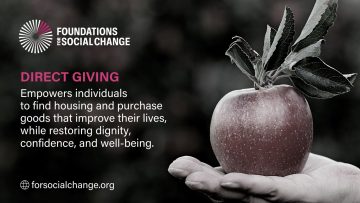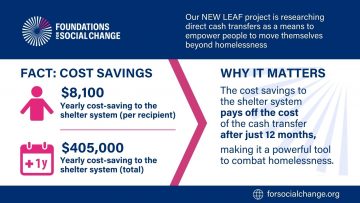Forbes spoke with Dr. Jiaying Zhao on Zhao’s study with Foundations for Social Change, a non-profit organization based in Vancouver. The study gave individuals experiencing homelessness a cash transfer of $7,500.
Links
Rethinking agricultural data through a justice lens
Farm-diversification research wins high kudos
The ineffectiveness of current environmental and fire policies in the world’s largest wetland
Solid Carbon receiving $24 million to advance ocean-based carbon dioxide removal
A primer for the practice of reflexivity in conservation science: https://doi.org/10.1111/conl.13047
Transformative Influence? The Hedonic and Eudaimonic Sustainabilities of Social Media Influencers: https://doi.org/10.1080/17524032.2025.2458227
IRES Seminar Series:
- April 3, 2025: IRES Professional Development Seminar with Angela Danyluk
- April 10, 2025: Student Symposium with Nikki Kaechele, Barry Momodou and Ilke Geladi
Contribute to IRES research:
- Log stinky smells in Vancouver!
- Share COVID-19 vignettes for the Ecologies of Harm project by emailing Anth.CovidVulnerabilityMap@ubc.ca
Despite good intentions, 5G might widen the gap between farmers
ZME Science highlighted a study led by Zia Mehrabi, a research associate at IRES/SPPGA. The study shows a widening gap between small-scale farmers and those who are more technologically advanced.
To save threatened plants and animals, restore habitat on farms, ranches and other working lands
Claire Kremen, UBC IRES/Zoology prof, co-wrote about a study that found restoring native habitats to at least 20 per cent of the world’s land currently being used by humans for farming, ranching and forestry is necessary to protect biodiversity and slow species loss.
Ottawa’s climate-change policies fail to protect First Nations against food scarcity: study
“No matter what we do by 2030,” said IRES’s Kai Chain, “it’s going to get a lot worse for those northern communities, just by virtue of the inertia already in the system.” He called on the federal government to immediately redouble its efforts to reduce greenhouse gas emissions.
Woodfibre LNG and climate played a role in swinging this B.C. riding Green
Local issues can tip the balance when it comes to votes, whereas global concerns sometimes don’t, said Kai Chan, IRES prof.
Bank loans scrutinized for harm to wildlife as well as climate
Kai Chan, IRES prof and lead author of the IPBES report, was quoted about sustainable economies and the role of banks in financing economic activities that impact biodiversity.
Why all human rights depend on a healthy environment
David Boyd, IRES/SPPGA prof, wrote about the importance of placing human rights and nature at the heart of sustainable development to attain a just and sustainable future.
Science leads the way in initiative providing direct cash transfers to individuals experiencing homelessness
There are major benefits to giving money directly to individuals experiencing homelessness, shows a study by the charity Foundations for Social Change and Jiaying Zhao, professor at IRES and UBC Psychology.

Their findings counter many of the assumptions people have about homelessness and are being shared by prominent media outlets, politicians, and public figures, hopefully leading to greater humanitarian impacts.
From the get-go, Zhao and Foundations for Social Change CEO Claire Williams believed that humanitarian efforts can benefit from scientific principles. While other people were quick to ridicule the idea of cash transfers to individuals experiencing homelessness, Zhao and Williams stuck to an evidence-based approach.
“At the end of the day, this collaboration is a scientific endeavor,” said Zhao. “I was willing to accept whatever results that came out. That’s science, and you find out whether this approach works or not.”
What the study found is striking. Results show that providing a cash transfer of $7,500 to each of the 50 individuals experiencing homelessness in B.C.’s Lower Mainland allowed the recipients to move into stable housing more quickly. They retained over $1,000 more in savings over one year, spent less money on temptation goods such as alcohol and drugs, and achieved food security sooner than a control group who did not receive the cash transfer.
Importantly, the study offers the first causal evidence on the power of direct cash transfers on homelessness reduction. From a cost-benefit analysis, the $7,500 cash transfer led to a total savings of $8,172 per person per year from reduced reliance on the shelter system, resulting in a net savings of $672 per person per year. This demonstrates that the direct cash transfer approach is more cost-effective than the status quo and can save the government and taxpayers a lot of money.

This pilot project was made possible by a grant from the federal government as well as many private donors and foundations. In addition to the financial support, Zhao expressed gratitude toward UBC’s Behavioural Research Ethics Board that initially raised many questions regarding participant safety and potential risks of harm. “I understand where the Ethics Board members are coming from and am grateful for their support over the last few years,” said Zhao. “Getting approval from BREB was definitely not easy. They raised the most difficult questions but it was a good exercise for us because now we can deal with any skeptics.”
The paper will be going through peer review – another challenge that Zhao is ready to face along with the work of expanding the study. “I would invite people to join our expansion project if they are interested,” she said. “Please send us comments and feedback that can help guide our next expansion project. I would absolutely welcome that.”
Foundations for Social Change hopes to expand their project to other cities in Canada including Toronto, Montreal, Ottawa and Halifax. Since homelessness is not a homogenous problem, the team is again adopting the stance they started with. Science – including a rigorous study design, implementation, and data collection – will lead the way.